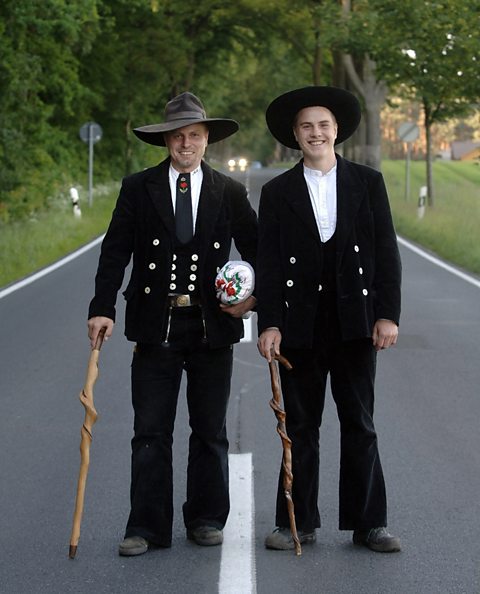Jobs and professions
Generally, German-speaking countries tend to have a fairly high rate of employment and are an important export market for British goods. This means there is often a high demand in British firms for people with German language skills.
Hilfsvokabeln – Helpful vocabulary
Professions (male forms)
- der Dozent – lecturer
- der Lehrer – teacher
- der Krankenpfleger – male nurse, carer
- der Moderator – TV presenter
- der Schauspieler – actor
- der Schüler – male pupil
- der Sportler – sportsman
How do German speakers say what they do for a living?
Was sind Sie von Beruf?– What do you do for a living?
Listen to these people telling us what they do.
This clip is from: BBC TWO Talk German
Did you notice two important facts?
Fact one
In German, you omit the indefinite articleThe indefinite article goes before a noun and indicates that the person, place or thing cannot be identified, ie it could be one of many. In English it would be 'a' or 'an', eg I took a suitcase on holiday. 'a' – ein, eine, when saying what you do for a living. This means that you do not follow the same pattern as English and say, 'I am a doctor' or 'I am a pensioner', but instead leave it out completely, eg
- ich bin Konditormeister – I'm [a] master cake-maker
- ich bin Fischer – I'm [a] fisherman
Fact two
The men and women answered slightly differently. The man said ich bin Student and the woman said ich bin Studentin. This is the feminine form.
- Student (male student) but Studentin (female student)
- Lehrer (male teacher) but Lehrerin (female teacher)
Question
Was sind Sie von Beruf?
Translate the following sentences into German. All are male forms.
- I'm a pupil.
- I'm a sportsman.
- I'm a TV presenter.
- I'm a master cake-maker.
- I'm an actor.
- Ich bin Schüler.
- Ich bin Sportler.
- Ich bin Moderator.
- Ich bin Konditormeister.
- Ich bin Schauspieler.
Did you know?

The word Meister is used together with a number of professions to show that someone is an expert or literally 'master' of their trade, eg a master cake-maker is Konditormeister, a master baker is Bäckmeister, and a master mechanic is Mechanikermeister.
Tradesmen traditionally work their way up the career ladder starting as an apprentice – Auszubildene, or Azubi for short. They then move up a rank to become a journeyman – Geselle.
This period lasts for exactly three years and one day. Finally, after producing a masterpiece from their chosen trade, they are accepted as a Meister into a guild of masters.
Gesellen are easy to spot as they dress in distinctive, old-fashioned looking costumes, consisting of black hats, white shirts, black jackets with silver buttons and bell-bottomed cords. To help support themselves, they often ask for donations in bars and cafés. Most people are learning to become masters in carpentry, roofing, tiling and plumbing.